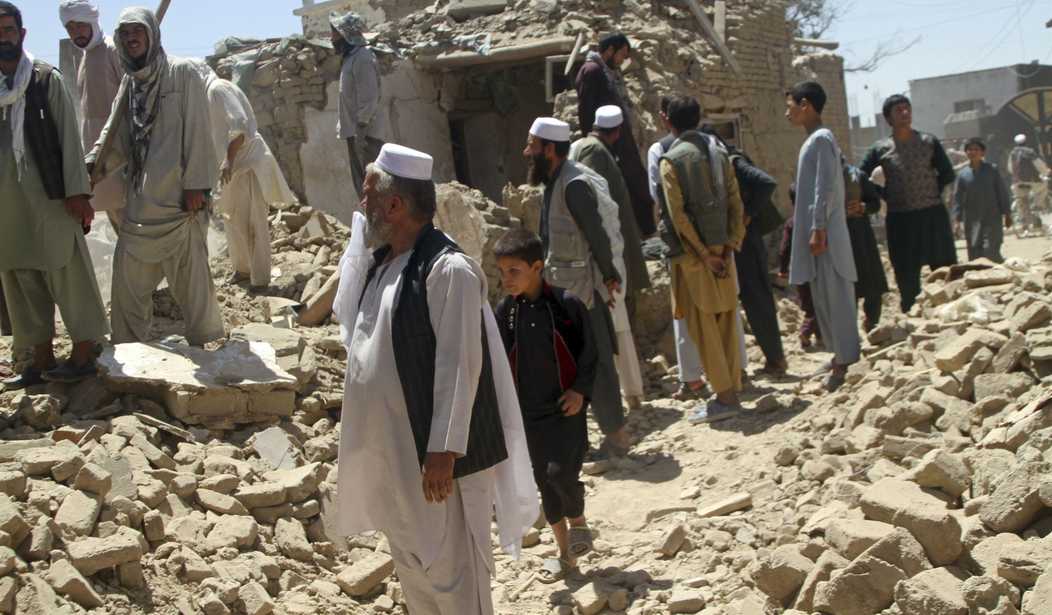Yesterday we looked at the ongoing collapse of the US-backed Afghan government’s control of the country as America and its allies prepare to depart. Up until then, most of the provinces that were retaken by the Taliban and its terrorist allies had been the smaller, rural areas with few population centers. That changed last night when we learned that the insurgents had taken control of Kunduz Province. Situated on the country’s northern border with Tajikistan, Kunduz has a population of nearly one million and is home to Kunduz University. This is one of the regions in Afghanistan that had previously shown significant progress in reforming the nation’s repressive Islamic traditions, with women finally being allowed access to advanced educational opportunities and at least some independence. That will likely all be coming to an end now as the warlords continue their path toward wiping out any advancements realized during the American occupation. (Associated Press)
Taliban fighters took control of a key district in Afghanistan’s northern Kunduz province Monday and encircled the provincial capital, police said, as the insurgent group added to its recent battlefield victories while peace talks have stalemated.
The Taliban’s gains came as the Pentagon reaffirmed the U.S. troop withdrawal was still on pace to conclude by early September.
Fighting around Imam Sahib district began late Sunday and by midday Monday the Taliban had overrun the district headquarters and were in control of police headquarters, said Inamuddin Rahmani, provincial police spokesman said.
There isn’t much in the way of video coverage available for obvious reasons, but a film crew from France 24 captured some of the chaos.
The descriptions of the situation on the ground in Kunduz last night were fairly grim. The insurgents hadn’t entered the heart of the capital yet, but sporadic gunfire could be heard coming from the outskirts of the city. Both the provincial HQ and the police headquarters had already been taken over. Residents were lining up to find some way to safely exit the city and attempt to make their way to Kabul, which is now virtually the only part of Afghanistan that remains fully under the control of the government.
There were reportedly conflicting statements coming from the Pentagon, with one official stating (off the record) that we might consider delaying the withdrawal in the face of these increased Taliban offensives. But another spokesperson said that we would remain on track to be out of the country by early September.
At this point, it appears to be both militarily and politically impossible to pull the plug on the evacuation. Both the United States and our allies have already either shipped out or abandoned vast amounts of resources required to maintain our presence there and significant numbers of both troops and civilian contractors have either shipped out or are in the process of doing so. The biggest concern at this point is whether or not we will be able to safely extract the last divisions of our troops.
The Taliban is making it very clear that they will not honor any of the promises they made in negotiating ceasefires or other concessions and plan to eliminate the American-sponsored government immediately. But would they really dare to mount a serious military offensive against our last remaining troops and contractors as they are packing up the final flights out of the country? If they did we could certainly launch some punishing airstrikes against their forces, but if we incur serious losses during the evacuation, this will turn into a complete disaster and an embarrassment to the nation on top of the misery the country will experience watching all of the flag-draped coffins returning from overseas.
It’s unclear what other alternatives were available to the Biden administration, though. We’ve been fighting the Taliban for twenty years at this point. If there were some way to launch another significant surge and try to wipe them out we would have done it by now. But they don’t have a conventional army that clusters together in strongholds where we could attack them. They are scattered around the country in small groups with little in the way of command and control infrastructure.
I can’t escape the feeling that this isn’t going to end well. And all of the translators and helpers that we are leaving behind are in for a very bad time once we’re gone.








Join the conversation as a VIP Member